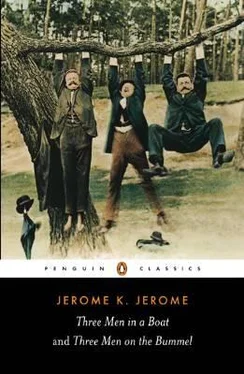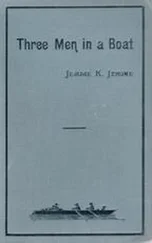Jerome Jerome - Three Men on the Bummel
Здесь есть возможность читать онлайн «Jerome Jerome - Three Men on the Bummel» весь текст электронной книги совершенно бесплатно (целиком полную версию без сокращений). В некоторых случаях можно слушать аудио, скачать через торрент в формате fb2 и присутствует краткое содержание. Жанр: Юмористическая проза, на английском языке. Описание произведения, (предисловие) а так же отзывы посетителей доступны на портале библиотеки ЛибКат.
- Название:Three Men on the Bummel
- Автор:
- Жанр:
- Год:неизвестен
- ISBN:нет данных
- Рейтинг книги:4 / 5. Голосов: 1
-
Избранное:Добавить в избранное
- Отзывы:
-
Ваша оценка:
- 80
- 1
- 2
- 3
- 4
- 5
Three Men on the Bummel: краткое содержание, описание и аннотация
Предлагаем к чтению аннотацию, описание, краткое содержание или предисловие (зависит от того, что написал сам автор книги «Three Men on the Bummel»). Если вы не нашли необходимую информацию о книге — напишите в комментариях, мы постараемся отыскать её.
Three Men on the Bummel — читать онлайн бесплатно полную книгу (весь текст) целиком
Ниже представлен текст книги, разбитый по страницам. Система сохранения места последней прочитанной страницы, позволяет с удобством читать онлайн бесплатно книгу «Three Men on the Bummel», без необходимости каждый раз заново искать на чём Вы остановились. Поставьте закладку, и сможете в любой момент перейти на страницу, на которой закончили чтение.
Интервал:
Закладка:
I would that I had followed his advice always; I would have saved myself and other people much disaster. I see no reason why it should be, but so it is. If I instruct a man as to the best route between London and Rome, he loses his luggage in Switzerland, or is nearly shipwrecked off Dover. If I counsel him in the purchase of a camera, he gets run in by the German police for photographing fortresses. I once took a deal of trouble to explain to a man how to marry his deceased wife's sister at Stockholm. I found out for him the time the boat left Hull and the best hotels to stop at. There was not a single mistake from beginning to end in the information with which I supplied him; no hitch occurred anywhere; yet now he never speaks to me.
Therefore it is that I have come to restrain my passion for the giving of information; therefore it is that nothing in the nature of practical instruction will be found, if I can help it, within these pages.
There will be no description of towns, no historical reminiscences, no architecture, no morals.
I once asked an intelligent foreigner what he thought of London.
He said: "It is a very big town."
I said: "What struck you most about it?"
He replied: "The people."
I said: "Compared with other towns-Paris, Rome, Berlin,-what did you think of it?"
He shrugged his shoulders. "It is bigger," he said; "what more can one say?"
One anthill is very much like another. So many avenues, wide or narrow, where the little creatures swarm in strange confusion; these bustling by, important; these halting to pow-wow with one another. These struggling with big burdens; those but basking in the sun. So many granaries stored with food; so many cells where the little things sleep, and eat, and love; the corner where lie their little white bones. This hive is larger, the next smaller. This nest lies on the sand, and another under the stones. This was built but yesterday, while that was fashioned ages ago, some say even before the swallows came; who knows?
Nor will there be found herein folk-lore or story.
Every valley where lie homesteads has its song. I will tell you the plot; you can turn it into verse and set it to music of your own.
There lived a lass, and there came a lad, who loved and rode away.
It is a monotonous song, written in many languages; for the young man seems to have been a mighty traveller. Here in sentimental Germany they remember him well. So also the dwellers of the Blue Alsatian Mountains remember his coming among them; while, if my memory serves me truly, he likewise visited the Banks of Allan Water. A veritable Wandering Jew is he; for still the foolish girls listen, so they say, to the dying away of his hoof-beats.
In this land of many ruins, that long while ago were voice-filled homes, linger many legends; and here again, giving you the essentials, I leave you to cook the dish for yourself. Take a human heart or two, assorted; a bundle of human passions-there are not many of them, half a dozen at the most; season with a mixture of good and evil; flavour the whole with the sauce of death, and serve up where and when you will. "The Saint's Cell," "The Haunted Keep," "The Dungeon Grave," "The Lover's Leap"-call it what you will, the stew's the same.
Lastly, in this book there will be no scenery. This is not laziness on my part; it is self-control. Nothing is easier to write than scenery; nothing more difficult and unnecessary to read. When Gibbon had to trust to travellers' tales for a description of the Hellespont, and the Rhine was chiefly familiar to English students through the medium of Caesar's Commentaries, it behoved every globe-trotter, for whatever distance, to describe to the best of his ability the things that he had seen. Dr. Johnson, familiar with little else than the view down Fleet Street, could read the description of a Yorkshire moor with pleasure and with profit. To a cockney who had never seen higher ground than the Hog's Back in Surrey, an account of Snowdon must have appeared exciting. But we, or rather the steam-engine and the camera for us, have changed all that. The man who plays tennis every year at the foot of the Matterhorn, and billiards on the summit of the Rigi, does not thank you for an elaborate and painstaking description of the Grampian Hills. To the average man, who has seen a dozen oil paintings, a hundred photographs, a thousand pictures in the illustrated journals, and a couple of panoramas of Niagara, the word-painting of a waterfall is tedious.
An American friend of mine, a cultured gentleman, who loved poetry well enough for its own sake, told me that he had obtained a more correct and more satisfying idea of the Lake district from an eighteenpenny book of photographic views than from all the works of Coleridge, Southey, and Wordsworth put together. I also remember his saying concerning this subject of scenery in literature, that he would thank an author as much for writing an eloquent description of what he had just had for dinner. But this was in reference to another argument; namely, the proper province of each art. My friend maintained that just as canvas and colour were the wrong mediums for story telling, so word-painting was, at its best, but a clumsy method of conveying impressions that could much better be received through the eye.
As regards the question, there also lingers in my memory very distinctly a hot school afternoon. The class was for English literature, and the proceedings commenced with the reading of a certain lengthy, but otherwise unobjectionable, poem. The author's name, I am ashamed to say, I have forgotten, together with the title of the poem. The reading finished, we closed our books, and the Professor, a kindly, white-haired old gentleman, suggested our giving in our own words an account of what we had just read.
"Tell me," said the Professor, encouragingly, "what it is all about."
"Please, sir," said the first boy-he spoke with bowed head and evident reluctance, as though the subject were one which, left to himself, he would never have mentioned,-"it is about a maiden."
"Yes," agreed the Professor; "but I want you to tell me in your own words. We do not speak of a maiden, you know; we say a girl. Yes, it is about a girl. Go on."
"A girl," repeated the top boy, the substitution apparently increasing his embarrassment, "who lived in a wood."
"What sort of a wood?" asked the Professor.
The first boy examined his inkpot carefully, and then looked at the ceiling.
"Come," urged the Professor, growing impatient, "you have been reading about this wood for the last ten minutes. Surely you can tell me something concerning it."
"The gnarly trees, their twisted branches"-recommenced the top boy.
"No, no," interrupted the Professor; "I do not want you to repeat the poem. I want you to tell me in your own words what sort of a wood it was where the girl lived."
The Professor tapped his foot impatiently; the top boy made a dash for it.
"Please, sir, it was the usual sort of a wood."
"Tell him what sort of a wood," said he, pointing to the second lad.
The second boy said it was a "green wood." This annoyed the Professor still more; he called the second boy a blockhead, though really I cannot see why, and passed on to the third, who, for the last minute, had been sitting apparently on hot plates, with his right arm waving up and down like a distracted semaphore signal. He would have had to say it the next second, whether the Professor had asked him or not; he was red in the face, holding his knowledge in.
"A dark and gloomy wood," shouted the third boy, with much relief to his feelings.
"A dark and gloomy wood," repeated the Professor, with evident approval. "And why was it dark and gloomy?"
The third boy was still equal to the occasion.
"Because the sun could not get inside it."
Читать дальшеИнтервал:
Закладка:
Похожие книги на «Three Men on the Bummel»
Представляем Вашему вниманию похожие книги на «Three Men on the Bummel» списком для выбора. Мы отобрали схожую по названию и смыслу литературу в надежде предоставить читателям больше вариантов отыскать новые, интересные, ещё непрочитанные произведения.
Обсуждение, отзывы о книге «Three Men on the Bummel» и просто собственные мнения читателей. Оставьте ваши комментарии, напишите, что Вы думаете о произведении, его смысле или главных героях. Укажите что конкретно понравилось, а что нет, и почему Вы так считаете.










